KbL i7-8550U
I'm researching the behavior of uops-cache and came across a misunderstanding regarding it.
As specified in the Intel Optimization Manual 2.5.2.2 (emp. mine):
The Decoded ICache consists of 32 sets. Each set contains eight Ways. Each Way can hold up to six micro-ops.
-
All micro-ops in a Way represent instructions which are statically contiguous in the code and have their EIPs within the same aligned 32-byte region.
-
Up to three Ways may be dedicated to the same 32-byte aligned chunk, allowing a total of 18 micro-ops to be cached per 32-byte region of the original IA program.
-
A non-conditional branch is the last micro-op in a Way.
CASE 1:
Consider the following routine:
uop.h
void inhibit_uops_cache(size_t);
uop.S
align 32
inhibit_uops_cache:
mov edx, esi
mov edx, esi
mov edx, esi
mov edx, esi
mov edx, esi
mov edx, esi
jmp decrement_jmp_tgt
decrement_jmp_tgt:
dec rdi
ja inhibit_uops_cache ;ja is intentional to avoid Macro-fusion
ret
To make sure that the code of the routine is actually 32-bytes aligned here is the asm
0x555555554820 <inhibit_uops_cache> mov edx,esi
0x555555554822 <inhibit_uops_cache+2> mov edx,esi
0x555555554824 <inhibit_uops_cache+4> mov edx,esi
0x555555554826 <inhibit_uops_cache+6> mov edx,esi
0x555555554828 <inhibit_uops_cache+8> mov edx,esi
0x55555555482a <inhibit_uops_cache+10> mov edx,esi
0x55555555482c <inhibit_uops_cache+12> jmp 0x55555555482e <decrement_jmp_tgt>
0x55555555482e <decrement_jmp_tgt> dec rdi
0x555555554831 <decrement_jmp_tgt+3> ja 0x555555554820 <inhibit_uops_cache>
0x555555554833 <decrement_jmp_tgt+5> ret
0x555555554834 <decrement_jmp_tgt+6> nop
0x555555554835 <decrement_jmp_tgt+7> nop
0x555555554836 <decrement_jmp_tgt+8> nop
0x555555554837 <decrement_jmp_tgt+9> nop
0x555555554838 <decrement_jmp_tgt+10> nop
0x555555554839 <decrement_jmp_tgt+11> nop
0x55555555483a <decrement_jmp_tgt+12> nop
0x55555555483b <decrement_jmp_tgt+13> nop
0x55555555483c <decrement_jmp_tgt+14> nop
0x55555555483d <decrement_jmp_tgt+15> nop
0x55555555483e <decrement_jmp_tgt+16> nop
0x55555555483f <decrement_jmp_tgt+17> nop
running as
int main(void){
inhibit_uops_cache(4096 * 4096 * 128L);
}
I got the counters
Performance counter stats for './bin':
6 431 201 748 idq.dsb_cycles (56,91%)
19 175 741 518 idq.dsb_uops (57,13%)
7 866 687 idq.mite_uops (57,36%)
3 954 421 idq.ms_uops (57,46%)
560 459 dsb2mite_switches.penalty_cycles (57,28%)
884 486 frontend_retired.dsb_miss (57,05%)
6 782 598 787 cycles (56,82%)
1,749000366 seconds time elapsed
1,748985000 seconds user
0,000000000 seconds sys
This is exactly what I expected to get.
The vast majority of uops came from uops cache. Also uops number perfectly matches with my expectation
mov edx, esi - 1 uop;
jmp imm - 1 uop; near
dec rdi - 1 uop;
ja - 1 uop; near
4096 * 4096 * 128 * 9 = 19 327 352 832 approximately equal to the counters 19 326 755 442 + 3 836 395 + 1 642 975
CASE 2:
Consider the implementation of inhibit_uops_cache which is different by one instruction commented out:
align 32
inhibit_uops_cache:
mov edx, esi
mov edx, esi
mov edx, esi
mov edx, esi
mov edx, esi
; mov edx, esi
jmp decrement_jmp_tgt
decrement_jmp_tgt:
dec rdi
ja inhibit_uops_cache ;ja is intentional to avoid Macro-fusion
ret
disas:
0x555555554820 <inhibit_uops_cache> mov edx,esi
0x555555554822 <inhibit_uops_cache+2> mov edx,esi
0x555555554824 <inhibit_uops_cache+4> mov edx,esi
0x555555554826 <inhibit_uops_cache+6> mov edx,esi
0x555555554828 <inhibit_uops_cache+8> mov edx,esi
0x55555555482a <inhibit_uops_cache+10> jmp 0x55555555482c <decrement_jmp_tgt>
0x55555555482c <decrement_jmp_tgt> dec rdi
0x55555555482f <decrement_jmp_tgt+3> ja 0x555555554820 <inhibit_uops_cache>
0x555555554831 <decrement_jmp_tgt+5> ret
0x555555554832 <decrement_jmp_tgt+6> nop
0x555555554833 <decrement_jmp_tgt+7> nop
0x555555554834 <decrement_jmp_tgt+8> nop
0x555555554835 <decrement_jmp_tgt+9> nop
0x555555554836 <decrement_jmp_tgt+10> nop
0x555555554837 <decrement_jmp_tgt+11> nop
0x555555554838 <decrement_jmp_tgt+12> nop
0x555555554839 <decrement_jmp_tgt+13> nop
0x55555555483a <decrement_jmp_tgt+14> nop
0x55555555483b <decrement_jmp_tgt+15> nop
0x55555555483c <decrement_jmp_tgt+16> nop
0x55555555483d <decrement_jmp_tgt+17> nop
0x55555555483e <decrement_jmp_tgt+18> nop
0x55555555483f <decrement_jmp_tgt+19> nop
running as
int main(void){
inhibit_uops_cache(4096 * 4096 * 128L);
}
I got the counters
Performance counter stats for './bin':
2 464 970 970 idq.dsb_cycles (56,93%)
6 197 024 207 idq.dsb_uops (57,01%)
10 845 763 859 idq.mite_uops (57,19%)
3 022 089 idq.ms_uops (57,38%)
321 614 dsb2mite_switches.penalty_cycles (57,35%)
1 733 465 236 frontend_retired.dsb_miss (57,16%)
8 405 643 642 cycles (56,97%)
2,117538141 seconds time elapsed
2,117511000 seconds user
0,000000000 seconds sys
The counters are completely unexpected.
I expected all the uops come from dsb as before since the routine matches the requirements of uops cache.
By contrast, almost 70% of uops came from Legacy Decode Pipeline.
QUESTION: What's wrong with the CASE 2? What counters to look at to understand what's going on?
UPD: Following @PeterCordes idea I checked the 32-byte alignment of the unconditional branch target decrement_jmp_tgt. Here is the result:
CASE 3:
Aligning onconditional jump target to 32 byte as follows
align 32
inhibit_uops_cache:
mov edx, esi
mov edx, esi
mov edx, esi
mov edx, esi
mov edx, esi
; mov edx, esi
jmp decrement_jmp_tgt
align 32 ; align 16 does not change anything
decrement_jmp_tgt:
dec rdi
ja inhibit_uops_cache
ret
disas:
0x555555554820 <inhibit_uops_cache> mov edx,esi
0x555555554822 <inhibit_uops_cache+2> mov edx,esi
0x555555554824 <inhibit_uops_cache+4> mov edx,esi
0x555555554826 <inhibit_uops_cache+6> mov edx,esi
0x555555554828 <inhibit_uops_cache+8> mov edx,esi
0x55555555482a <inhibit_uops_cache+10> jmp 0x555555554840 <decrement_jmp_tgt>
#nops to meet the alignment
0x555555554840 <decrement_jmp_tgt> dec rdi
0x555555554843 <decrement_jmp_tgt+3> ja 0x555555554820 <inhibit_uops_cache>
0x555555554845 <decrement_jmp_tgt+5> ret
and running as
int main(void){
inhibit_uops_cache(4096 * 4096 * 128L);
}
I got the following counters
Performance counter stats for './bin':
4 296 298 295 idq.dsb_cycles (57,19%)
17 145 751 147 idq.dsb_uops (57,32%)
45 834 799 idq.mite_uops (57,32%)
1 896 769 idq.ms_uops (57,32%)
136 865 dsb2mite_switches.penalty_cycles (57,04%)
161 314 frontend_retired.dsb_miss (56,90%)
4 319 137 397 cycles (56,91%)
1,096792233 seconds time elapsed
1,096759000 seconds user
0,000000000 seconds sys
The result is perfectly expected. More then 99% of the uops came from dsb.
Avg dsb uops delivery rate = 17 145 751 147 / 4 296 298 295 = 3.99
Which is close to the peak bandwith.


